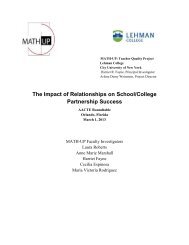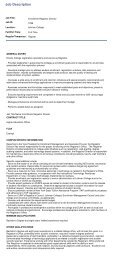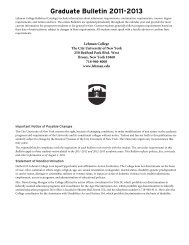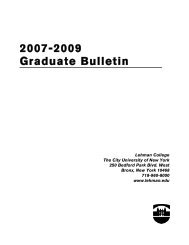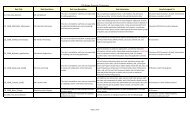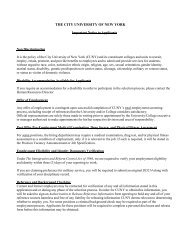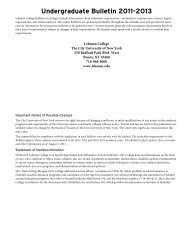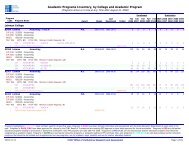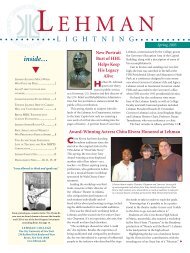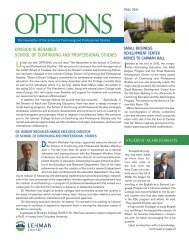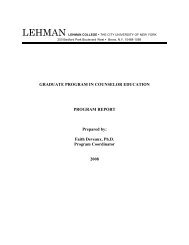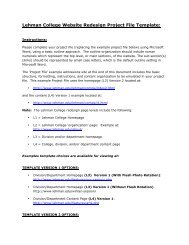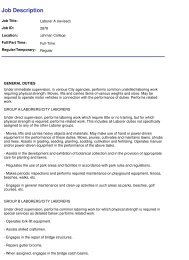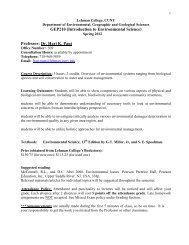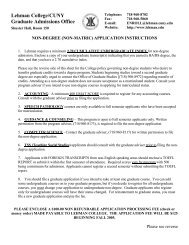Lehman Center Turns Thirty - Lehman College
Lehman Center Turns Thirty - Lehman College
Lehman Center Turns Thirty - Lehman College
You also want an ePaper? Increase the reach of your titles
YUMPU automatically turns print PDFs into web optimized ePapers that Google loves.
Four Alumni Win Fulbright<br />
2010 proved to be a banner year for <strong>Lehman</strong> alumni<br />
competing for prestigious Fulbright Awards for post-<br />
graduate study, teaching, and research abroad. Three<br />
recent alumnae, as well as an alumnus from the Class<br />
Mikaela Chase, Class of 2009:<br />
Studying End-of-Life Care in Tibet<br />
When Mikaela Chase went to Nepal for six months during her<br />
junior year at <strong>Lehman</strong>, she did not realize it would change her life.<br />
While volunteering in a Nepalese hospital, she saw a little girl, no<br />
more than six years old, dying. By the child’s side were her mother<br />
and grandmother.<br />
“In Nepal, there is no one to care for the<br />
dying,” says Chase. “Family are expected to<br />
do the work that professional nurses would<br />
do here—changing bedpans, wiping brows.<br />
There are no trained nurses.”<br />
That’s when Chase, an anthropology major,<br />
found her calling. A 2009 graduate of the<br />
Macaulay Honors <strong>College</strong> at <strong>Lehman</strong>, as well as a Watson Fellow,<br />
she won a prestigious Fulbright Scholarship in 2010 to travel to<br />
Nepal to study Tibetan Buddhism and end-of-life care. She previously<br />
studied abroad not only in Nepal but also in Mexico. Her final<br />
Watson summer internship was completed at Harvard.<br />
“The Dalai Lama has said that Buddhism is not only a religion but<br />
also a science and a philosophy,” says Chase, who is spending a<br />
year documenting the responses of Tibetan doctors trained in both<br />
Western and traditional medicines. Her hope is that by studying<br />
non-Western medical practices, end-of-life care policy in the U.S.—<br />
where the topic is still somewhat taboo—can be improved.<br />
“Sixty percent of Americans die in hospitals,” she says. “In order to<br />
improve policy and care-giving practices related to death within the<br />
healthcare system, we need to understand the various ethicalmoral<br />
frameworks that reflect the common human experience of<br />
approaching death.”<br />
Adds Chase: “Death shouldn’t be a topic we’re afraid to discuss.”<br />
Fellowships<br />
of 1975, are now in Latin America, the Mideast, and the Far East, pursuing a variety of scholarly interests, from<br />
Rastafarian craftsmanship to Tibetan end-of-life care. They join <strong>Lehman</strong> faculty in numerous departments, as well<br />
as fellow graduates, who are previous Fulbright recipients.<br />
The program, which operates in 155 countries, is the flagship international educational exchange program<br />
sponsored by the U.S. government and is designed to increase mutual understanding between the people of the<br />
United States and those of other countries. Recipients of Fulbright grants are selected on the basis of academic<br />
or professional achievement, as well as demonstrated leadership potential in their fields.<br />
Jasmine Fryer, Class of 2010:<br />
Teaching and Studying in Jordan<br />
Jasmine Fryer discovered her calling in her eighth-grade Social<br />
Studies class. At a young age, she developed a passion for travel<br />
and knew that she wanted to see the world. “Our teacher taught us<br />
that history was alive and that we were very much a part of it,” she<br />
recalls. “I wanted to see distant lands and<br />
meet diverse people.”<br />
She’s now getting her chance. Fryer, who<br />
graduated from <strong>Lehman</strong> in 2010 with<br />
a master’s in secondary social studies<br />
education, is working at Al-Ahliyya Amman<br />
University, in Amman, Jordan, as a Fulbright<br />
Scholar throughout the 2010-11 academic<br />
year as part of an English Teaching Assistantship.<br />
Besides teaching, she is studying Arabic.<br />
It’s not the first step on Fryer’s world tour: Since 2006, the Cleveland<br />
native has taught English in Thailand, studied at the School for<br />
International Training in Morocco, and worked as a business manager<br />
for a Chinese export firm in Beijing. “I want to travel around<br />
the world, in part to better understand the global issues that we all<br />
face,” she says, “and see how diverse people tackle these issues.”<br />
She traces her inspiring accomplishments back to her time at<br />
<strong>Lehman</strong>. “My <strong>Lehman</strong> professors inspired me to challenge myself<br />
academically, professionally, and personally to be the best I can be<br />
for myself and those around me,” she says. “If I needed anything,<br />
they were willing to help me complete assignments, write recommendations,<br />
offer advice, or help make professional or academic<br />
contacts.” In particular, she singles out Lynne Van Voorhis, assistant<br />
dean of Undergraduate Studies and Study Abroad. “She supported<br />
me from the beginning and urged me to apply. She helped<br />
me network with professors who had studied in the region or had<br />
participated in the Fulbright program.”<br />
Dr. Jose Guevara-Escudero, Class of<br />
1975: Teaching History in Honduras<br />
Historian Jose Guevara-Escudero, Ph.D. begins a new chapter<br />
in his life when he returns to Honduras in January as a Fulbright<br />
Scholar. He’ll lecture on nineteenth-century Honduran economic<br />
history at Pedagogica Nacional University and continue his archival<br />
research on the socioeconomic history of modern Honduras.<br />
“I always knew I’d be a historian,” he said. “As a young boy, I took<br />
my job as class historian very seriously. My mother gave me great<br />
books to read, like 1001 Arabian Nights and The Last of the Mohicans.<br />
They opened up the world for me.”<br />
Near his grandmother’s house in Nicaragua, he discovered a secret<br />
garden. “I was called ‘el niño del jardin’,” he said. “I would read and<br />
listen quietly to people outside the garden talking about their lives<br />
and loves. It was magical.”<br />
Born in Honduras, Jose moved at age fifteen with his Brazilian<br />
mother to the Bronx, where he attended Theodore Roosevelt High<br />
School on Fordham Road. Then he joined the U.S. Navy, serving<br />
two tours of duty during the Vietnam War. Afterward, he enrolled at<br />
<strong>Lehman</strong> and graduated with honors in 1975.<br />
Professor Margaret E. Crahan was his academic adviser and a<br />
great help in his career as a historian. Professors Eric Wolf and<br />
Fausto Esteves were hugely influential.<br />
“Fausto had a Continental air,” said Dr.<br />
Guevara-Escudero. “He talked to us about<br />
his travels, about music, poetry, people<br />
and places I’d never heard of before. And<br />
Professor Wolf was just about the best<br />
human being I have ever met. Maybe it was<br />
his Jewish-socialist-Viennese background<br />
that made him so inclusive of all people—but I’ll always remember<br />
Eric saying that everyone needs to be educated. Everyone needs<br />
to go to college. If you’re going to be carpenter, it will make you a<br />
better carpenter.<br />
“I say those same words to my students. I tell them to read and<br />
to get a degree—they’ll be better at anything they do. I encourage<br />
them to travel and get out of their comfort zones.”<br />
After graduation, he won a Rockefeller Foundation Fellowship for<br />
graduate work in Latin American history at Johns Hopkins University,<br />
completed his doctorate at New York University, and now is<br />
assistant professor of history at Pace University.<br />
In the 1980s, when teaching jobs for historians were hard to come<br />
by, Dr. Guevara-Escudero became a Certified Financial Planner and<br />
set up a company, Interamerican Economic Services, working with<br />
private and institutional clients while teaching financial planning on<br />
the side.<br />
He’s delighted to be returning to his passion for archival research<br />
with the new Fulbright. “It’s never a lonely pursuit,” he said. “I may<br />
be in a dusty archive that no one else in the world has seen. But<br />
I’m there with the people I’m learning about, and they are giving me<br />
their most personal, private information.”<br />
One of his areas of specialization is the study of immigration—a hot<br />
topic in U.S. politics today. “As a historian, I was trained to look at<br />
the past to explain the present—and the past tells us that immigration<br />
can go both ways,” he said.<br />
“Americans are getting older, and we don’t have a good system of<br />
caring for older people. I think we’ll see more and more of them<br />
moving south to countries like Nicaragua, where there’s a culture<br />
of caring and very little violence,” he said. “You can do better with<br />
retirement money and a Social Security check. There’s good, free<br />
socialized medicine delivered by the health professionals who have<br />
been well trained in Cuba.”<br />
Dr. Guevara-Escudero met his wife, Catherine Barbara Kaplan<br />
(Political Science and Russian, ‘74) at <strong>Lehman</strong>. Now divorced,<br />
they are good friends who enjoy the company of their two grown<br />
children and infant grandson.<br />
For fun and fitness, Dr. Guevara-Escudero dances the tango.<br />
“You have to feel the music,” he said. “It took me a while to get up<br />
the nerve, but now I can visit milongas in New York City and around<br />
the world.”<br />
His advice to New Yorkers: “Get to know your Latino and Latina<br />
neighbors and coworkers better. There are twenty-two countries<br />
south of the border. Go out to dinner with friends, and don’t just eat<br />
Mexican food—there are many fine cuisines<br />
from Latin America right here in our city.”<br />
Nicole JeanBaptiste,<br />
Class of 2009:<br />
Studying Rastafarian<br />
Craftsmanship<br />
in Jamaica<br />
When Nicole JeanBaptiste opened the email she received one<br />
day last March, she wasn’t sure what she would find. A <strong>Lehman</strong><br />
graduate of the Class of 2009, she had applied to a highly competitive<br />
African Studies graduate program. But the email did not<br />
contain good news: she had been rejected. “I was disappointed,”<br />
she recalls, “but, to be honest, I handled it better than I thought<br />
I would.”<br />
JeanBaptiste, a graduate of the Macaulay Honors <strong>College</strong> at<br />
<strong>Lehman</strong>, closed her computer and went to get the old-fashioned<br />
kind of mail. Inside the mailbox was a package from the Institute<br />
of International Education, the organization that sponsors Fulbright<br />
Scholarships. “I could tell by the size of the envelope—it was<br />
large—that I got accepted.” She immediately contacted her <strong>Lehman</strong><br />
professors, like Professor Anne Rice of the Department of African<br />
and African American Studies, who wrote letters of recommendation<br />
for her application.<br />
The Fulbright Fellowship is funding JeanBaptiste’s research this<br />
year at Jamaica’s University of the West Indies, where she’s exploring<br />
the history and development of Rastafarian craftsmanship.<br />
When she returns to the U.S., she plans on pursuing her Ph.D. in<br />
medical anthropology.<br />
When she returns from Jordan at the end of the academic year,<br />
Fryer intends on applying to law school and eventually work in in-<br />
“By winning this Fulbright, Nicole has shown how innovative and<br />
important her project is,” says Professor Rice. “She’s a really bright,<br />
ternational law and sustainable economic development. Her goal is<br />
to “empower individuals and meet global challenges that transcend<br />
ambitious, and determined student.” <br />
10 <strong>Lehman</strong> Today/Fall 2010 – Winter 2011<br />
borders, disciplines, and sectors.”<br />
<strong>Lehman</strong> Today/Fall 2010 – Winter 2011 11



